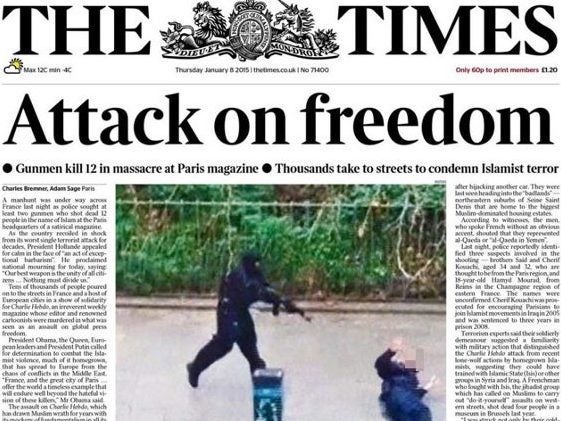
Media reports on terrorist attacks and the accompanying images fuel the killers’ propaganda, Britain’s independent watchdog on terrorism has warned.
Publishing images of dead terrorists helped “create a cult of martyrdom” for those claiming to act in the name of some “noble cause”, The Times has reported Max Hill QC as saying.
Hill, head of Red Lion Chambers in London, was appointed as the UK’s independent reviewer of terrorism legislation earlier this year.
He has called for “far greater care” to be taken to avoid giving the oxygen of publicity to those who seemed to crave martyrdom, the newspaper has reported.
But solicitor Mark Stephens, partner and head of media law at law firm Howard Kennedy, said it was a false narrative to believe that people were recruited through online forums or publicity about terrorist attacks.
Law enforcement agencies had discovered that terrorists were actually being recruited face-to-face, through out-of-hours sessions in or near small mosques, and not through media coverage of attacks – he said.
“What you find is that the real risks are not being reported – in reality people have been really cautious in what they have said about terrorist incidents,” he said.
The Times criticised Mr Hill’s views in an editorial.
“The media has no business glorifying terrorism, but it has an urgent duty to report it,” it said.
“There is nothing more newsworthy than a terrorist attack, because there is nothing more urgent than to understand it, the better to prevent the next one.
“News organisations’ instinct to gather all the information they can about terrorist attacks and put it in the public realm leaves citizens to decide for themselves what to read and what to believe.
“The alternative of editors taking it upon themselves to decide what the public may know about terrorists’ motives, methods and impact is condescending and almost certainly counter-productive.”
Hill also took on proposals to tighten regulation on the internet to combat extremism and fine companies for failing to remove terrorist propaganda, which have been criticised by the Government’s anti-terror laws watchdog.
He said the suggestion of punishing tech companies like Facebook and Google for not acting on unacceptable content was not the best course of action because they needed to be “brought firmly onside”.
According to the Times, he said: “I struggle to see how it would help if our parliament were to criminalise tech company bosses who ‘don’t do enough’. How do we measure ‘enough’? What is the appropriate sanction?
“We do not live in China, where the internet simply goes dark for millions when government so decides. Our democratic society cannot be treated that way.”
Prime Minister Theresa May outlined the idea of punishing companies such as Facebook, YouTube and Google if they fail to remove extremist propaganda and terrorist material from their platforms in the wake of the Manchester Arena bombing and two terror attacks in London.
Email pged@pressgazette.co.uk to point out mistakes, provide story tips or send in a letter for publication on our "Letters Page" blog
